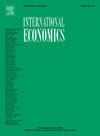Systemic financial stress and the returns and volatility of ESG-themed assets
引用次数: 0
Abstract
A firm’s negative environmental performance directly affects its financial outcomes, such as returns and stock price volatility. Consequently, the role of investors’ attitudes toward environmentally responsible investment in shaping growth dynamics has recently occupied center stage in research and policy debates. This paper quantifies the financial relevance of environmental, social, and governance (ESG) assets by rigorously assessing the dynamic interactions of returns and volatility between the global financial stress index and various ESG-themed assets. We study how periods of financial turbulence impact performance and resilience narratives of these investments. Given the inherently dynamic nature of these interactions, we identify distinct spillover effects by estimating a Time-varying Parameter Vector Autoregression model using a high-frequency, decade-long sample (February 28, 2014 to March 06, 2024), which covers multiple crisis periods including the COVID-19 pandemic and the ongoing Russia-Ukraine and Israel-Gaza wars. Our findings reveal that volatility connectedness peaked during the COVID-19 pandemic and was weakest during the Israel-Gaza war. While short-term developments dominate return connectedness, volatility connectedness is consistently driven by long-term factors. In terms of return connectedness, financial stress is found to be a net transmitter of shocks to the ESG market in the short term, while in terms of volatility connectedness, it is also a net transmitter of shocks except during war periods. Across ESG markets and at both frequencies, the global ESG index emerged as the primary source of return and volatility connectedness, whereas the Asia-Pacific ESG market was the main recipient of shocks. Our results can guide investors, policy makers, and companies in adopting and promoting specific ESG practices, ultimately fostering a more resilient and sustainable global economy.
系统性金融压力与esg主题资产的回报和波动性
企业的负环境绩效直接影响其财务结果,如回报和股价波动。因此,投资者对环境负责任投资的态度在塑造增长动力方面的作用最近在研究和政策辩论中占据了中心位置。本文通过严格评估全球金融压力指数与各种ESG主题资产之间的回报和波动之间的动态相互作用,量化了环境、社会和治理(ESG)资产的金融相关性。我们研究金融动荡时期如何影响这些投资的表现和弹性叙述。鉴于这些相互作用的内在动态性,我们利用一个长达十年的高频样本(2014年2月28日至2024年3月6日),通过估计时变参数向量自回归模型,确定了不同的溢出效应,该样本涵盖了多个危机时期,包括COVID-19大流行和正在进行的俄罗斯-乌克兰和以色列-加沙战争。我们的研究结果表明,波动连通性在2019冠状病毒病大流行期间达到峰值,在以色列-加沙战争期间最弱。虽然短期发展主导着回报连通性,但波动性连通性始终受到长期因素的驱动。就回报连通性而言,我们发现金融压力在短期内是ESG市场冲击的净传递者,而就波动性连通性而言,除了战争时期,它也是冲击的净传递者。在ESG市场中,在两个频率下,全球ESG指数成为回报和波动性连通性的主要来源,而亚太ESG市场则是冲击的主要接受者。我们的研究结果可以指导投资者、政策制定者和企业采用和推广具体的ESG实践,最终促进更具弹性和可持续性的全球经济。
本文章由计算机程序翻译,如有差异,请以英文原文为准。
求助全文
约1分钟内获得全文
求助全文
来源期刊

International Economics
Economics, Econometrics and Finance-Economics, Econometrics and Finance (all)
CiteScore
6.30
自引率
0.00%
发文量
74
审稿时长
71 days
 求助内容:
求助内容: 应助结果提醒方式:
应助结果提醒方式:


